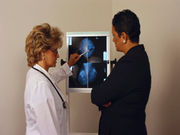Higher likelihood of MRI, PET use for women assigned to surgeons whose peers had highest use
WEDNESDAY, May 24, 2017 (HealthDay News) — The likelihood of advanced imaging (magnetic resonance imaging [MRI] and positron emission tomography [PET]) use is increased for women assigned to surgeons whose peers had the highest rate of baseline imaging use, according to a study published recently in the Journal of the National Cancer Institute.
Craig E. Pollack, M.D., from the Johns Hopkins School of Medicine in Baltimore, and colleagues used Surveillance, Epidemiology, and End Results-Medicare data to construct peer groups of physicians with shared patients to examine the impact of social contagion on adoption of imaging modalities for breast cancer patients.
The researchers identified 6,424 women diagnosed in the follow-up period (2007 to 2009), assigned to 986 non-early-adopting surgeons for MRI. Overall, 9.3 percent of women received an MRI during baseline (2004 to 2006), ranging across peer groups from 0 to 81 percent. Compared with women whose surgeons’ peers did not use MRI, women assigned to surgeons whose peers had the highest rate of baseline MRI use were more likely to receive MRI (24.9 versus 10.1 percent; adjusted odds ratio, 2.47). A similar correlation was seen for uptake of PET imaging (odds ratio for highest versus lowest baseline peer group PET use, 2.04).
“The phenomenon of social contagion may offer opportunities to better understand how new approaches to cancer care disseminate into clinical practice,” the authors write.
Several authors disclosed financial ties to 21st Century Oncology. One author disclosed ties to the medical technology and pharmaceutical industries.
Abstract/Full Text (subscription or payment may be required)
Copyright © 2017 HealthDay. All rights reserved.








